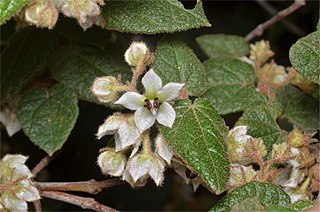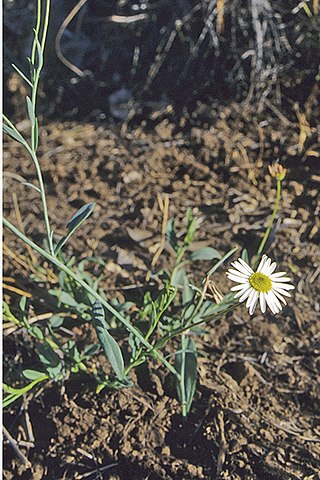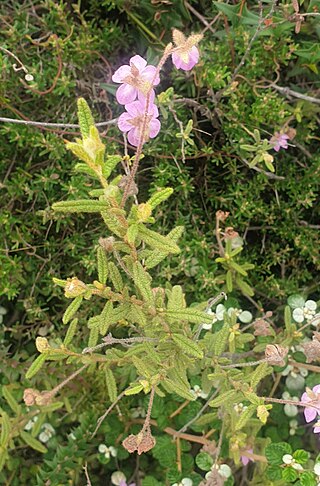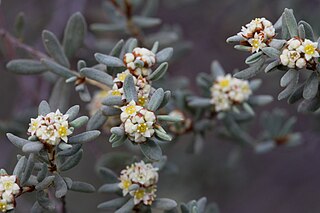
Rutidosis leptorrhynchoides, commonly known as button wrinklewort, is a flowering plant in the family Asteraceae. It is an upright, tufted, perennial herb with bright green leaves and yellow button-shaped flowers.

Howittia is a genus of plant containing the single species, Howittia trilocularis, commonly known as blue howittia, and is endemic to Australia. It is a tall shrub found growing in shaded valleys and on rainforest edges, it has hairy leaves and single, purple flowers.

Brachyscome chrysoglossa, the yellow-tongue daisy, is a perennial herb from Australia in the family Asteraceae. The species is endemic to Australia.

Podolobium alpestre, commonly known as alpine shaggy-pea, is a flowering plant in the family Fabaceae and is endemic to south-eastern Australia. It has oblong to egg-shaped leaves and yellow to orange pea-like flowers with red markings.

Lasiopetalum schulzenii, commonly known as drooping velvet-bush, is a species of flowering plant in the family Malvaceae and is endemic to southern continental Australia. It is a shrub with heart-shaped leaves and small groups of hairy white and reddish-brown flowers.

Podolobium procumbens, commonly known as trailing shaggy-pea, trailing podolobium or trailing oxylobium, is a flowering plant in the family Fabaceae and is endemic to south-eastern Australia. It is a trailing small shrub with oval-shaped leaves and orange pea-like flowers.

Pultenaea densifolia, commonly known as dense-leaved bush-pea, is a species of flowering plant in the family Fabaceae and is endemic to southern continental Australia. It is a spreading or low-lying shrub with broadly egg-shaped, down-curved leaves and clusters of purple or yellow, red and purple flowers.

Nymphoides crenata, commonly known as wavy marshwort, is an aquatic perennial herb of the family Menyanthaceae endemic to Australia, found in all mainland states and the Northern Territory

Brachyscome aculeata, commonly known as hill daisy, is a tufted perennial herb in the family Asteraceae and is endemic to Australia. It has mostly white daisy-like flowers, a yellow centre, variable shaped leaves and flowers in spring to autumn.

Brachyscome graminea, commonly known as grass daisy, is a perennial herb in the family Asteraceae and is endemic to Australia. It has mostly mauve-pink or purple daisy-like flowers and a yellow centre.

Brachyscome basaltica, commonly known as swamp daisy, is a perennial herb in the family Asteraceae and is endemic to Australia. It has mostly white daisy-like flowers and a yellow centre.

Brachyscome decipiens, commonly known as field daisy, is a perennial herb in the family Asteraceae and is endemic to Australia. It is a small herb with white or pale blue flowers.

Thomasia petalocalyx, commonly known as paper flower, is a species of flowering plant in the family Malvaceae and is endemic to southern Australia. It is a shrub with wrinkled, oblong to egg-shaped leaves and cup-shaped mauve flowers.

Brachyscome dentata, commonly known as lobe-seed daisy, is a tufted perennial herb in the family Asteraceae and is endemic to Australia. It has mostly white or mauve daisy-like flowers, a yellow centre and pale green leaves. It is endemic to Australia.

Nematolepis ovatifolia, is a small shrub with rusty coloured scales on the stems, smooth, glossy leaves and white flowers in small clusters in summer. It is endemic to New South Wales.
Pultenaea benthamii, commonly known as Bentham's bush-pea, is a species of flowering plant in the family Fabaceae and is endemic to south-eastern continental Australia. It is an erect shrub with sharply-pointed, narrow elliptic to linear leaves and yellow to orange and red flowers in clusters at the ends of branches.

Pultenaea canaliculata, commonly known as coast bush-pea, is a species of flowering plant in the family Fabaceae and is endemic to coastal areas of southern continental Australia. It is an rigid, spreading shrub with hairy, cylindrical leaves, and yellow and crimson flowers.
Bossiaea distichoclada is a species of flowering plant in the family Fabaceae and is endemic to south-eastern continental Australia. It is an erect shrub with hairy branches, kidney-shaped to more or less round or heart-shaped leaves with the narrower end towards the base, and uniformly bright yellow flowers.

Spyridium subochreatum is a species of flowering plant in the family Rhamnaceae and is endemic to southern continental Australia. It is a low shrub with linear to oblong or narrowly egg-shaped leaves, and dense clusters of creamy-white flowers with dark brown, papery bracts at the base.

Brachyscome spathulata, commonly known as spoon-leaved daisy, is a flowering plant in the family Asteraceae. It has dark green leaves, mauve daisy-like flowers and grows in New South Wales, Tasmania, Victoria and the Australian Capital Territory.




















